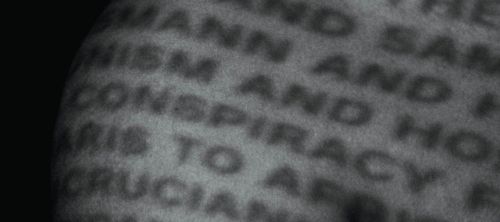Achille Mbembe on Freemasonry, Homosexuality and Enrichment

Why do conspiracy theories have such power over so many people? Trying to refute them seems to have little effect. The challenge with the present tsunami of conspiracy thinking and “alternative facts” is rather to try and understand their mobilizing force. Achille Mbembe, Rachel Spronk and Francio Guadeloupe discuss the challenges of plot thinking and the need to historicize it.
In their recent book Conspiracy Narratives from postcolonial Africa: Freemasonry, Homosexuality and Illicit Enrichment Rogers Orock and Peter Geschiere tackle a key challenge to academics: how to deal with the rampanty growth of conspiracy theories in the present-day world. If attempts to refute them only make the believers more convinced, the challenge might rather be how to explain why these often quite unorthodox ideas acquire such a hold over so many people.
In their book, the authors try to understand why after 2005 Cameroon became abruptly one of the most homophobic countries in Africa. The historical key in this case is the popular resentment of Freemasonry and other secret societies being omnipresent among the national elite and currently associated with homosexuality and enrichment. The challenge is to understand why around 2005 these elements were suddenly combined in a powerful denunciation of the national regime for corrupting the nation from the inside. This idea of a “click” – disparate elements being suddenly linked into a frame that worked – makes this study of more general relevance for understanding the sway of conspiracy thinking over the present-day world. Achille Mbembe and Rachel Spronk will discuss the wider relevance of this case study. Francio Guadeloupe will act as moderator.
About the speakers
Achille Joseph Mbembe is a professor in history and politics at the University of the Witwatersrand in Johannesburg. As a world-renowned philosopher, he lectures all over the world and writes columns in African and French newspapers. His noteworthy books have been translated into multiple languages. On the occasion of the Spinoza Lens 2025, his latest work, The Earthly Community, will be published in Dutch translation (Boom publishers Amsterdam).
Rachel Spronk is professor of Sexuality and Gender, anthropology, University of Amsterdam. In her research she focusses on historical trajectories in the production of gender and sexuality, and their relevance for present-day relations. A central question is how people’s lived experiences must shape our theoretical models. In this she pays special attention to the interface between sexuality and middle class in Ghana and Kenya while problematizing the presuppositions underneath these notions.
Francio Guadeloupe is senior research fellow at the Royal Netherlands Institute for Southeast Asian and Caribbean Studies (KITLV- KNAW). He is also the endowed Professor in the Public Anthropology of Kingdom relations. Guadeloupe’s strategy in public anthropology consists of ethnographically studying and critically collaborating with community based organizations, civil society institutions, and grassroots media houses that seek to foster and study conviviality and solidarity within and across the Kingdom of the Netherlands. Guadeloupe has published widely, both peer review publications and popular scientific essays. He is the author of the monographs, Black Man in the Netherlands: an Afro-Antillean Anthropology (University of Mississippi Press 2022) and Chanting Down the New Jerusalem: Calypso, Christianity, and Capitalism in the Caribbean (University of California Press, 2009).
Rogers Orock is Assistant Professor in the Program for Africana Studies Program at Lafayette College. Dr. Orock’s research examines elites, political imagination, and the moral discourses on leadership and power in Central and West African societies (Cameroon, Gabon, and Nigeria). He co-edited Elites and the Politics of Accountability in Africa (with Wale Adebanwi, 2021).
Peter Geschiere is emeritus professor for the Anthropology of Africa at the University of Amsterdam and Leiden University. Since 1971 he has undertaken historical-anthropological field-work in various parts of Cameroon and elsewhere in West and Central Africa. He published on “witchcraft” and intimacy; autochthony, citizenship and belonging; Freemasonry and homophobia.